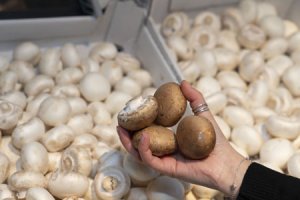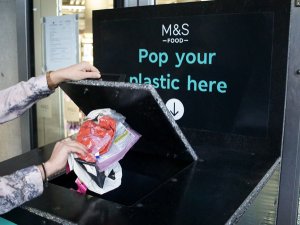In September, we outlined how we were step changing our approach to using plastic and we shared an update on our progress before Christmas on our blog. Four months on, here’s our highlight achievements:
- Reducing our plastic use
- Making our plastic easier to recycle
- Introducing a take-back initiative for plastic not recycled at kerbside
Plastic Reduction
Last year, we recognised that we needed to reduce our single-use plastic consumption and only use it where there is a clear benefit. That’s why, we set year-on-year 5% reduction targets to reduce our single use plastic footprint. We are on track to remove 1,000 tonnes by Spring 2019, which includes replacing the 75 million pieces of plastic cutlery given out in our stores each year with FSC certified wood alternatives.
We know plastic wrapped fruit and vegetables (produce) is a particular concern for our customers, so we challenged ourselves and asked, why not try going plastic free? In response to customer feedback, earlier this month we launched a three-month pilot in our Tolworth store in London, with over 90 lines of fruit and vegetables completely free of plastic packaging.
The two aisles of produce at Tolworth look and feel completely different, with berries and soft fruits in compostable pulp punnets and paper produce bags in place of our former plastic ones. We’ve even introduced reusable produce bags for heavier items like potatoes, and we are already seeing a steady uptake in these multi-use bags over paper ones. What’s more, we’ve removed best before date labels from all loose fruit and veg at Tolworth, so customers don’t throw away perfectly edible food based on the date alone and reduce their food waste in the home. As part of the trial, we’ve brought trained greengrocers back to the shop floor to encourage customers to choose the unwrapped versions, help them pick and weigh produce and offer advice on how best to preserve food in the home to minimise waste.
The trial is still in its early days – we have much to learn as we continue testing and adapting our approach. What we can say is, the majority of our customers have been positive about the changes. We also recognise for some customers it’ll take time to adjust, as self-weighing can be more time consuming and a number of customers perceive packaged fruit and veg to be fresher, so we have work to take them with us on our journey.
Making Plastic Easier to Recycle
We were the first retailer to announce that 100% of our packaging will be widely recyclable by 2022 and to commit to removing the most problematic plastics for recycling, such as polystyrene, by 2019.
By Spring 2019, we will have replaced 1,700 tonnes of black plastic packaging with easy to recycle alternatives, which includes all fruit and veg, Mini Bites tubs and a number of ready meal ranges. We are using up remaining black plastic stock and will be out of black in meat, poultry and fish by the Summer too.
Giving Non-Recyclable Plastic a New Life With Our Take-Back Scheme
While we’re on our way to phasing out all non-recyclable packaging by 2022, we want to help customers bring back any plastic that they can’t recycle at kerbside, so we can give it a completely new purpose.
Our customers have told us they don’t always know which types of packaging are recyclable by their local authorities and are concerned about the impact on the environment of non-recycled packaging. That’s why we’re on a mission to provide a greater awareness of landfill avoidance and plastic recyclability and have introduced a plastic take-back scheme to an initial eight stores (Tolworth, Cribbs Causeway, Westfield Stratford, Waterside, Loughton, Bluewater, Fosse Leicester, Peterborough) and we plan to scale nationwide as the year progresses.
Customers can drop any plastic that is non-recyclable, such as black plastic trays, crisp packets, films and certain cosmetics containers in our new recycling bins. The plastic will be sorted by colour and given a second life in partnership with Dow, a leader in plastics technology. We’ll turn customers’ used packaging into more recycling bins across our UK stores and school playground equipment.
A key part of our initiative involves sharing our insights with local authorities, such as the types of material customers are bringing back and where there may still be confusion, which will help with better local resident advice for kerbside recycling. We’re also working with waste education social enterprise, Wastebuster, to introduce recycling collection points to primary schools across the country, where pupils will be taught about the importance of reducing plastic waste and recycling and hopefully help ‘pester power’ their families into more action!
Encouraging consumers to shift their mindset and recycle as often as possible is vital to creating a circular economy. Much like our collaboration with Wastebuster, we are part of Hubbub’s flagship initiative #LeedsbyExample, which aims to create a step change in the recycling of food-to-go packaging.
More to Come
Our award-winning packaging team hold a number of external leadership roles, helping to influence system change from simpler consistent recycling logos and collaborative solutions for non-recyclable plastics, to supporting the government on Packaging Recovery Note (PRN) reforms to enable a much-needed recycling transformation.
Importantly, collaboration between the government, organisations and businesses is key to success. That’s why we’re part of the UK Plastics Pact and the New Plastics Economy’s Global Commitment to reduce plastic waste and pollution by 2025. This Spring, we are sponsoring the Great British clean-up, which is the UK’s biggest ever mass-action environmental campaign.
So, four months in and we’re off to a good start, but we are clear we have so much more to do to reach our goals and help build a New Plastic Economy. Led by our Food Managing Director Stuart Machin, our Five Plastic Principles (Refuse, Redesign, Reduce, Reuse and Recycle) are at the heart of everything we do, and we’ll continue to go faster and further over the next few months.
Louise Nicholls
Corporate Head of Human Rights, Food Sustainability and Food Packaging
Marks & Spencer



